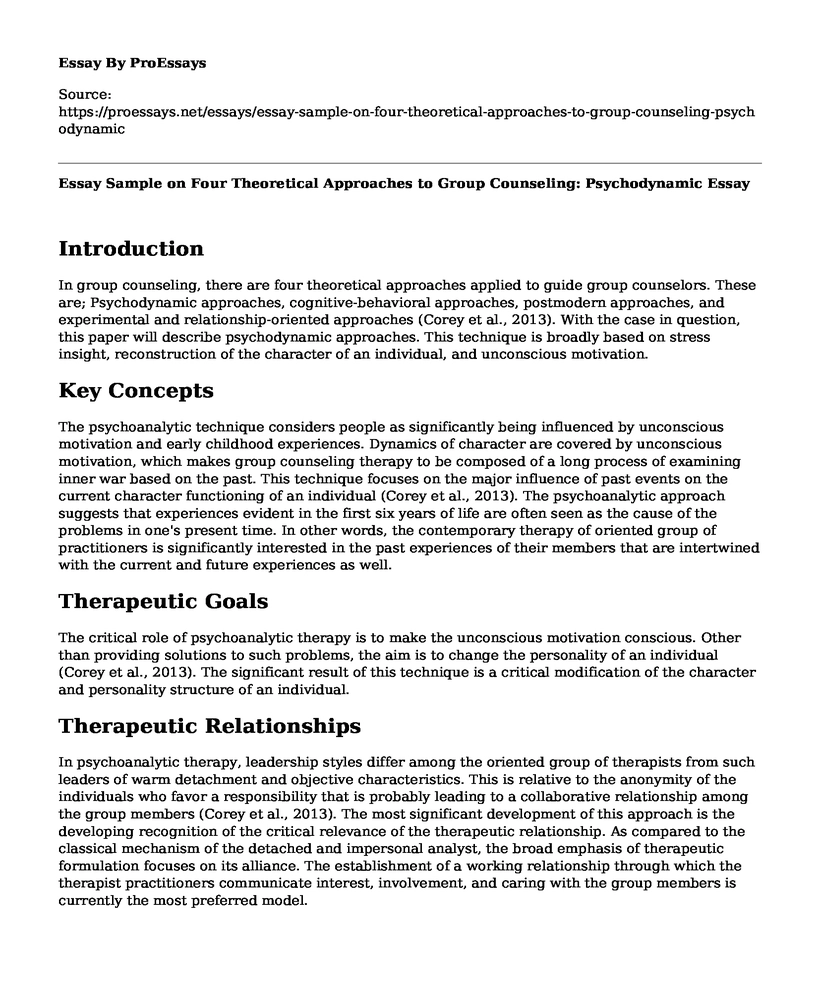Introduction
In group counseling, there are four theoretical approaches applied to guide group counselors. These are; Psychodynamic approaches, cognitive-behavioral approaches, postmodern approaches, and experimental and relationship-oriented approaches (Corey et al., 2013). With the case in question, this paper will describe psychodynamic approaches. This technique is broadly based on stress insight, reconstruction of the character of an individual, and unconscious motivation.
Key Concepts
The psychoanalytic technique considers people as significantly being influenced by unconscious motivation and early childhood experiences. Dynamics of character are covered by unconscious motivation, which makes group counseling therapy to be composed of a long process of examining inner war based on the past. This technique focuses on the major influence of past events on the current character functioning of an individual (Corey et al., 2013). The psychoanalytic approach suggests that experiences evident in the first six years of life are often seen as the cause of the problems in one's present time. In other words, the contemporary therapy of oriented group of practitioners is significantly interested in the past experiences of their members that are intertwined with the current and future experiences as well.
Therapeutic Goals
The critical role of psychoanalytic therapy is to make the unconscious motivation conscious. Other than providing solutions to such problems, the aim is to change the personality of an individual (Corey et al., 2013). The significant result of this technique is a critical modification of the character and personality structure of an individual.
Therapeutic Relationships
In psychoanalytic therapy, leadership styles differ among the oriented group of therapists from such leaders of warm detachment and objective characteristics. This is relative to the anonymity of the individuals who favor a responsibility that is probably leading to a collaborative relationship among the group members (Corey et al., 2013). The most significant development of this approach is the developing recognition of the critical relevance of the therapeutic relationship. As compared to the classical mechanism of the detached and impersonal analyst, the broad emphasis of therapeutic formulation focuses on its alliance. The establishment of a working relationship through which the therapist practitioners communicate interest, involvement, and caring with the group members is currently the most preferred model.
Techniques
The psychoanalytic approach consists of major techniques, which include; interpretations, analysis of transference, free association, analysis of dreams, maintenance of the analytic framework, and resistance analysis (Corey et al., 2013). These mechanisms are for purposes of enhancing awareness, starting and working a thorough process, and acquisition of insight, which leads to reorganization of the character of an individual.
Application of the Psychoanalytic Approach
The emphasis of the application of this approach is put on how the past experiences of the group members have on the broad emphasis on the influence of the personality and character of an individual (Corey et al., 2013). The approach has significance in taking into account the ways and cultural context in the sense that early experiences can give a new way of understanding present obstacles. With the application of this approach, clients can abandon old processes and come up with new processes in their current behavior.
Apart from the techniques of group counseling discussed in the coursebook, my approach that I think will help guide group counselors is the issue of Humanistic therapy. My view is based on its emphasis on the capacity of the people to make rational and informed choices and to develop their maximum potential. Also, my worldview and influence of this approach are the essences of respect and concern of others (Corey et al., 2013). This approach cares most about the current events and assisting individuals to achieve the highest potential. Despite the energy that could have otherwise spent on negative or past behaviors, the humanistic approach believes in the well-being of all the people, and its emphasis is based on personal self-actualization and self-growth. Nevertheless, this approach helps people to find their relevance in their day-to-day lives by focusing on self-determination, responsibility, and free will.
Reference
Corey, M. S., Corey, G., & Corey, C. (2013). Groups: Process and practice. Cengage Learning.
Cite this page
Essay Sample on Four Theoretical Approaches to Group Counseling: Psychodynamic. (2023, Apr 10). Retrieved from https://proessays.net/essays/essay-sample-on-four-theoretical-approaches-to-group-counseling-psychodynamic
If you are the original author of this essay and no longer wish to have it published on the ProEssays website, please click below to request its removal:
- Sexual Abuse Trauma Case Study
- Cause and Effect of Bullying Essay Outline
- Mental Health Problem in the United States Paper Example
- Sigmund Freud and Psychoanalysis Essay
- ISTJ: Introverted Thinkers With a Keen Sense of Duty - Essay Sample
- Essay on Adolescent and Young Adult Addiction: Impact of Age on Human Behavior
- Essay Example on Suicidal Behavior in Children: 60-77% Exposed to Abuse/Violence







